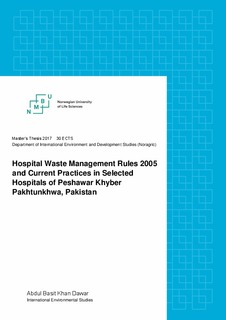| dc.description.abstract | Within the scope of the study, the current situation and management practices regarding healthcare waste such as waste generation, segregation, on-site and off side collection and transportation, storage, and disposal were examined. Moreover, this study analysed the implementation status of hospital waste management (HWM) rules 2005 in both public and private hospitals also discussed the overall causes of malpractices of waste management as well as factors contributing to better healthcare waste management particularly in the private hospitals of Peshawar, Khyber Pakhtunkhwa. Qualitative research method was used for this study. In total, forty-four interviews were conducted in selected public and private hospitals equally, of which thirty-seven were semi-structured interviews and remaining seven were informal interviews. The study found the improper applications, inconsistencies, and deficiencies in the whole system of the waste management. The limited knowledge of hospital waste management rules 2005 particularly among nurses, paramedics, waste handling staff and administration in public hospitals was a serious concern. Lack of proper and simple monitoring and supervision system has further exacerbated the situation. Similarly, the limited scope and complicated nature of the regulations in hospital waste management rules 2005 makes the compliance challenging. Based on the evaluation of hospital waste management (HWM) rules 2005 and comparison of the current practices in both public and private sectors, changes and amendments in the healthcare waste management legislation and the reasons for the gaps between the public and private sectors were identified. These include the revision of legislation section No.4 to section No.14 and similarly section No.23 and section No.24 to make the rules practically implementable in both public and private sectors. The findings should be a good basis for making improvements in the management of healthcare waste in Peshawar as well as in Khyber Pakhtunkhwa. | nb_NO |

